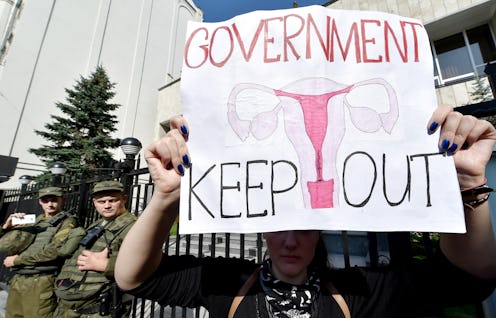News
Congress Is Revisiting This Extreme Abortion Bill

Since President Donald Trump's election victory in November, Republicans have wasted little time asserting an anti-abortion agenda across the country. First, Ohio lawmakers introduced a bill that would have made abortions illegal after about six weeks of pregnancy, which Gov. John Kasich vetoed. But a similar "Heartbeat Bill" was introduced in Congress by Iowa Rep. Steven King.
The proposed bill would make it illegal for doctors to perform abortions after a fetal heartbeat is detected, which typically occurs around six weeks into the pregnancy — many times before a woman even realizes that she's pregnant. While the proposition of such a restrictive bill is horrifying, the tiny sliver of good news is that this bill is not likely to pass. The bad news, however, is that the introduction of a six-week ban will make a 20-week abortion ban look a lot more reasonable to Congress, increasing the odds that a bill like that would actually pass.
In King's press release announcing the bill, he stated,
Since Roe v. Wade was unconstitutionally decided in 1973, nearly 60 million innocent babies' lives have been ended by the abortion industry, all with a rubber stamp by the federal government,” said King. “Human life, beginning at the moment of conception, is sacred in all of its forms and today, I introduced a bill that will protect the lives of voiceless innocents.
My legislation will require all physicians, before conducting an abortion, to detect the heartbeat of the unborn child. If a heartbeat is detected, the baby is protected.
At a news conference about the bill, BuzzFeed reported that King said the measure would block about 90 percent of abortions.
Unfortunately, this isn't the only attempt of pushing an anti-abortion agenda through the current administration. President Trump on Monday reinstated a policy to refuse American aid to foreign health providers who discuss abortion. Not only does the order not allow American tax money to be used to help foreign organizations that provide abortions, but also those who advocate for it or offer counseling. Also on Monday, Congress introduced HR 7, which would restrict insurance companies from offering coverage for abortions. The House approved the bill Tuesday, and now it goes to the Senate.
Overall, these measures might become more common throughout a Republican-controlled government. And if Trump's eventual Supreme Court nominee is against Roe v. Wade, we might have even more to be worried about. Now that we've seen these early actions from the administration, we need to be more vigilant than ever about letting our elected leaders know when we do not agree with their proposed policies. If we don't, women will likely be seeing many more men regulating their bodies without their input.